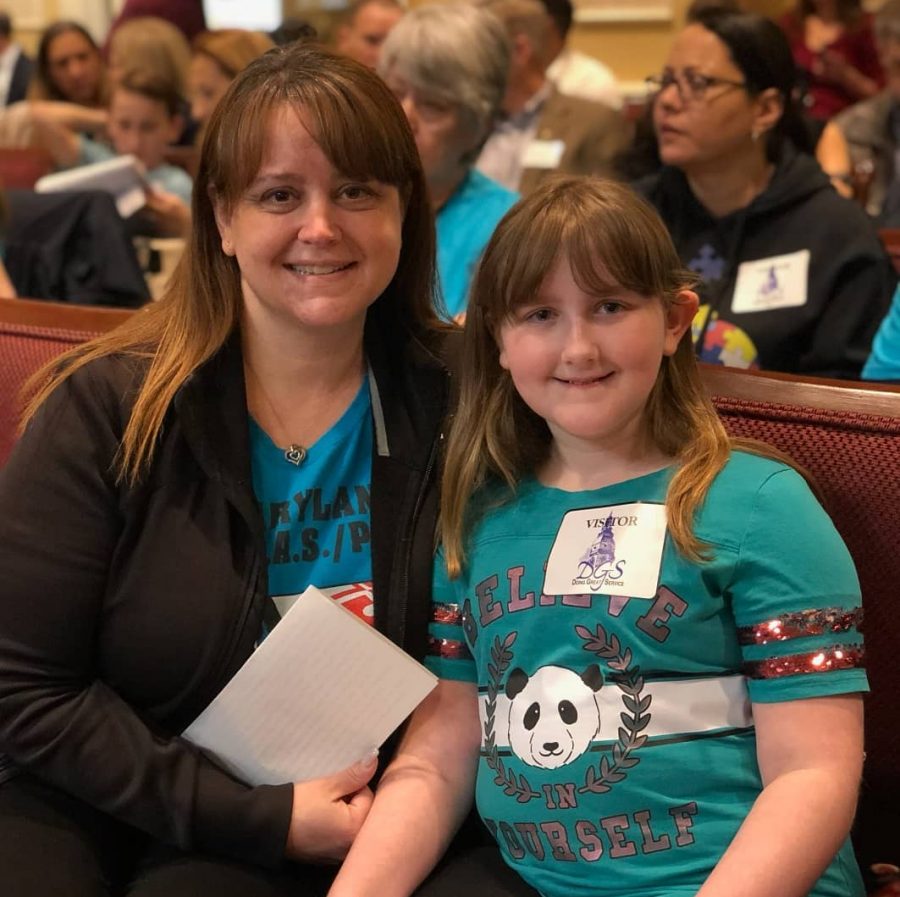Lomax Family Advocates for Insurance Coverage Bill
Photo courtesy of Jennifer Lomax
Jennifer Lomax testified against the House Bill 447 and her daughter Bella Lomax delivered a speech advocating for the Senate Bill 475 Feb. 26.
April 15, 2020
After unanimously passing the state legislature, House bill 447 and Senate bill 475 headed to Gov. Larry Hogan’s desk March 17, mandating insurance coverage for the illness Pediatric Autoimmune Neuropsychiatric Disorders Associated with Streptococcal Infections (PANDAS).
PANDAS, which is estimated to impact one in 200 children in the U.S., is seen as controversial in its diagnosis and treatment, according to the PANDAS Network Organization. It usually begins with an infection, most commonly strep throat. Certain bacteria cause immune cells to produce problematic antibody proteins which attack parts of the brain instead of attacking invading pathogens, leading to symptoms akin to obsessive compulsive disorder (OCD).
RHS faculty members Jennifer and Jason Lomax’s family flipped upside down when their daughter Bella was diagnosed with PANDAS at eight years old, Jennifer Lomax said. As her OCD worsened, Bella developed a sudden onset of tics, restrictive eating, suicidal thoughts, rage, anxiety, depression and panic attacks.
“It’s ridiculous that [insurance is not] paying for [treatment] for children because they don’t want to recognize this disease,” RHS information specialist Jennifer Lomax said. “There are kids that go 10 years before they get diagnosed because they go down the mental [health treatment] path when it’s really not a mental issue, it’s an autoimmune issue.”
Although PANDAS is a serious disease when left untreated, the American Academy of Pediatrics concluded in 2018 that there was insufficient evidence to recommend antibiotics or intravenous immunoglobulin therapy (IVIG) treatment to treat PANDAS. Instead, they suggested referrals to psychiatrists and neurologists to treat the child’s behavioral disorders; which is why many insurance companies refuse to recognize and cover these treatments, according to a March 4 Carroll County Times article. The disease is also seen as controversial because it is fairly new, having only been studied since the 1980’s.
“It remains controversial to the point where some people don’t believe it even exists and that’s where there’s trouble,” said Dr. Earl Harley, an ear, nose and throat doctor and surgeon at Georgetown University who has been treating PANDAS cases for years.
Uncovered by insurance, Bella Lomax’s doctor appointments for PANDAS range from $300-$1,200, which her parents are forced to pay out-of-pocket and with credit cards. The medical bills became impossible when they heard about the $28,000 IV treatment of Rituxan. As their only option, the Lomax’s opened a GoFundMe, and within nine days the RHS community rallied together to surpass their initial goal and donated a total of $28,770. This was when the Lomax’s realized that they must speak up and spread awareness of the disease, Jennifer Lomax said.
“It’s probably affecting a lot more kids than we know and even kids walking the halls of Rockville who probably think like ‘I just have a little bit of OCD and a little bit of rage, and a little bit of aggression, and a little bit of anxiety,’” Jennifer Lomax said. “Maybe you don’t; maybe it really is an immune issue that’s attacking your brain and if you get treatment, you can go back to that normal person because we’re seeing it and our daughter is finally coming back to her normal person.”
Jennifer Lomax testified at the House Bill 447 with Delegate Alfred Carr and Bella Lomax delivered a speech at the Senate Bill 475 testimony Feb. 26 along with her friend Lucas Murdock who also has PANDAS.
“Our goal is that no kid in the state of Maryland will ever have to go untreated,” Jennifer Lomax said. “They [won’t have to] go through the nightmare that we’ve gone through for three years.”
Molly and Jeremy Mattoon, parents of six-year-old Jackson Mattoon also testified at the House of Delegates, fighting for insurance coverage. The Mattoon family is very involved in the community, as Jeremy is an MDX lacrosse coach, coaching several RHS athletes.
Jackson Mattoon had a sudden onset of PANDAS symptoms including tics and OCD when he started preschool. His symptoms worsened over time with cases of strep infections to the point of severe eating restrictions and refusing to eat and take oral medications entirely. In January, he had to get an intramuscular PICC line for his medications. The Mattoon family was then faced with a $10,000 IVIG treatment, recommended by four separate doctors.
Jackson’s treatment was not covered by insurance and the Mattoons were pushed to pay out-of-pocket for this treatment on top of the expensive doctor’s appointments similar to the Lomax family.
If the bills are signed by Gov. Hogan, doctors will be able to become more aware and familiar with the illness, according to Mattoon. Many families like the Lomax and Mattoon families are relieved that the burden of costly treatments could be lifted if these bills are officially signed and are excited to focus on their children’s rehabilitation.
“We’re confident that we can take [Jackson’s] PICC line out on Friday [March 6] so we can kind of go back to normal life. We’re seeing glimpses of his personality back and [the treatment] has helped us, yes substantially.”





